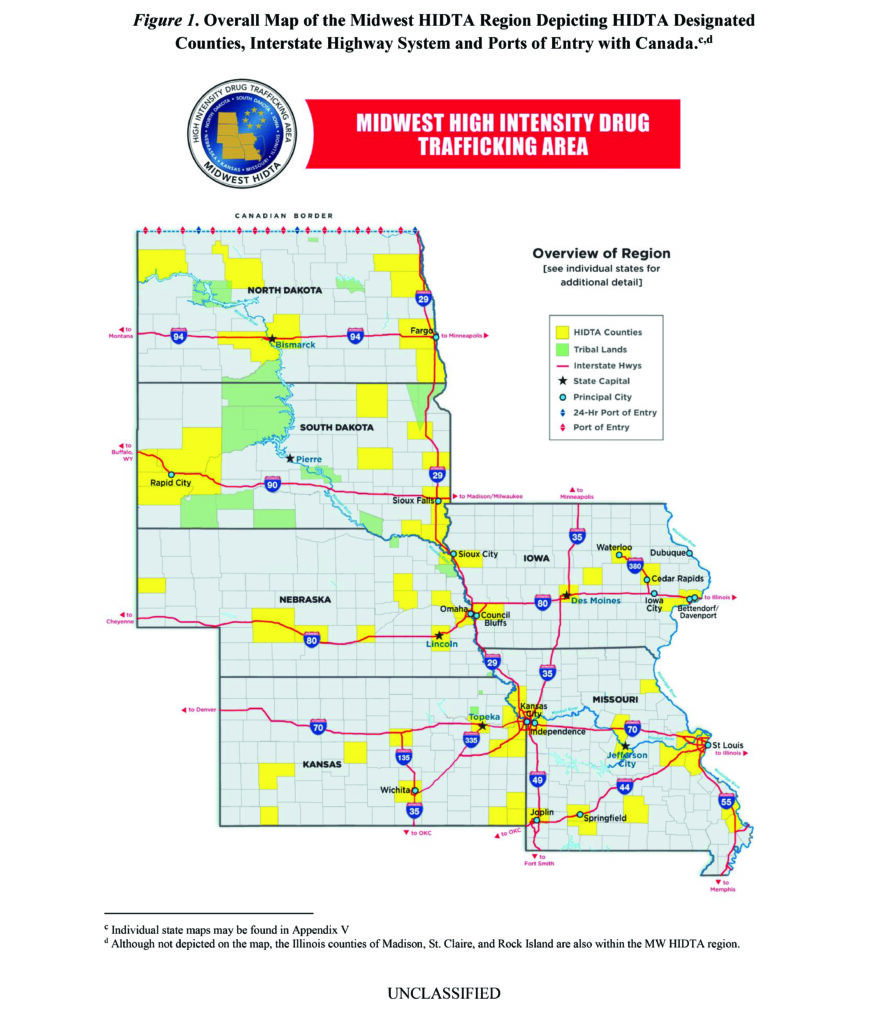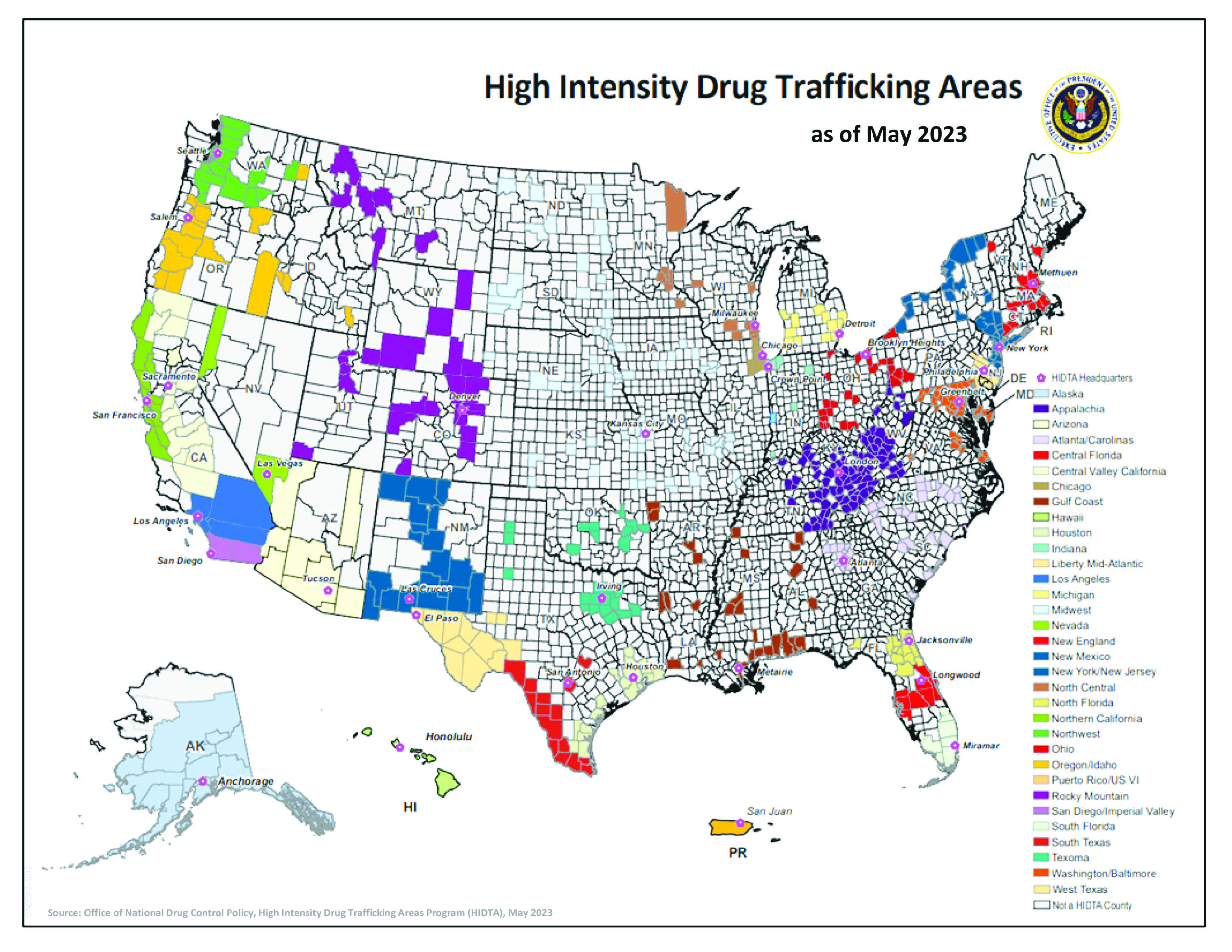Returning to Government-to-Government protocol would be seen as a first step to improving relations with Tribes

The Midwest HIDTA assesses that private passenger vehicles, the USPS, and commercial mailing services are the primary drug transportation methods used by DTOs to transport illicit drugs into and throughout the Midwest HIDTA region.
Governor Noem is reaching out to Tribes in the state. She says she wants to help them protect themselves from the “invasion” happening at the southern border. The long-time government public servant offered to accompany leaders to Washington, D.C. where she’ll help them lobby for their needs. Noem says she continues to request Law Enforcement Agreements between the State of South Dakota and the state’s Native American tribes. She has called on tribal leaders to banish the cartels which she claims are a result of Biden’s border policy. She says that the federal government has repeatedly failed “our Native American tribes.” She has entreated them to join in their lawsuit against the government to which Star Comes Out retorted, “Inadequate funding for law enforcement personnel, unfortunately, is not unique to this current federal administration, it has been existing for decades and we are now addressing it through our pending lawsuit.”
Good border policy is needed. Public safety issues in Indian Country also need to be finally solved. Republicans in Congress however, recently rejected a bipartisan border deal lawmakers had spent months negotiating, even though it was called the best border deal, which included many of their wants. Republicans said they wouldn’t do a border deal unless there was a change in policy, which they got. When the deal was imminent, Donald Trump said that he was against it. Speaker of the House Mike Johnson, who said the deal was dead on arrival denied that Trump had any influence. Republican Senator James Lankford who led the deal said in the end his colleagues didn’t really want change.
The Southern Border Communities Coalition say the southern border has always been a place of opportunity and hope and welcome the multinational character of the region. They say that the “mock war zone” that has been crafted does not make them safer and that Trump’s wall divided their communities, put people’s lives at risk, harmed wildlife and destroyed sacred Indigenous sites. They want an expansion of public safety, to uphold human rights and welcome “all people to our borders.”
Trump Administration solutions were at best ineffective. Trump’s border wall was built with unlawfully transferred Pentagon funding according to the southernborder.org. Biden returned the unspent portion when he took office. SBCC says that more than 60 laws were pushed aside for Trump’s wall construction.
The U.S. Customs and Border Patrol says that the southern border has become one of the most militarized regions in the world in the past 30 years. But is sending the South Dakota National Guard to the southern border, for a fifth time as Governor Noem recently did, an effective response? How does this action help tribal nations protect their communities? Could some of the funds used to deploy the SDNG be better spent assisting law enforcement both on and off the reservation?
Leaders of the People of the Seven Council fires have sought for decades to ensure the United States honors its commitments to the Peace Treaties it signed with the Lakota. But they feel that Governor Noem has used them for political gain. For nearly a year, Noem has been visiting non-Native communities in South Dakota and Texas, falsely connecting crime at the southern border to crime on reservations in South Dakota. She spoke to members of these non-Native communities falsely accusing tribal leaders of even being a part of the trafficking which she said spreads throughout the Midwest. The Rosebud Sioux, Oglala Sioux and Crow Creek Sioux tribal leaders sent letters to Noem saying her statements were ignorant, inflammatory, disparaging and intended to fuel a racially based narrative. Crow Creek Sioux Tribal Chairman told KELO that tribal members were being pulled over off-reservation, “held up, their cars destroyed” by drug checks because “they think we’re carrying cartel drugs.”
Frank Star Comes Out, President of the Oglala Sioux Tribe said he and the Council are working hard to protect their treaty lands. “Perhaps if the Governor is concerned about Tribal Law Enforcement, she could equalize the state Law Enforcement Funding, so Tribes receive equal amounts per person as the state does.” He said that inadequate funding is not unique to the current federal administration.
Tribal leaders often have solutions which are very often disregarded or co-opted at every government level. Many were provided by leaders who spoke at a recent Senate listening session on public safety. Star Comes Out in his letter from April 4 , 2024 addressed to the Governor said if she was really serious about helping, she could examine how she and her administration handle tribal relations “because it’s not working for us.”
There is a consultation process put in place to assist Nation-to-Nation efforts. Numerous leaders at the Senate listening session pointed to a failure of federal and local entities to follow the consultation process. If she really wanted to improve relations, Star Come Out said Noem could begin by reinstating the previous Board of South Dakota Indian Affairs Office with a representative from each of the nine tribes. “This worked in the past. It would ensure better communications between the Tribal governments and the State government and ensure that Tribes’ interests are heard, not just the State’s.” Star Comes Out questioned her sincerity, “Accusing the Sioux Tribes of harboring Mexican drug cartels on their reservations and calling for an audit of all federal funds tribes receive simply does not translate into a genuine “handshake” or offer of assistance.”
Again, many tribal nation leaders across the nation who spoke at the Senate listening session, spoke of inadequate law enforcement among the non-Native communities that border their reservations. Star Comes Out did as well, calling on Noem’s government and the state’s municipalities to prevent criminals from traveling through their jurisdictions on their way to tribal jurisdictions.
The offended tribal nations are still waiting for Noem to reveal her sources to back up her claim that the Mexican cartels are operating from the reservations. The Midwest HIDTA or High Density Drug Trafficking Area program statistics refute Noem’s claims. It names specifically the Sioux City and Sioux Falls area along I-29 which includes Lincoln and Minnehaha Counties as a distribution center. With a population of nearly 300-thousand, the area is a distribution center for methamphetamine, marijuana, powder cocaine, and MDMA for markets in Iowa, Minnesota, Nebraska, North Dakota and South Dakota. It states that Mexican traffickers “sell to Caucasian midlevel dealers” who then move it to their communities.
Small business owner Peri Pourier, State Representative for District 27, told Native Sun News Today that the Governor has found “justification to send troops to the border to keep her name in the national spotlight. It’s easy to create an enemy she can spar with that does not cost her anything from her base and actually shows her base.” Pourier said so far the Memorandums of Understanding are the only solutions the state will offer. She said what is needed is an accord, which is a compact or treaty.
(Contact Marnie Cook at staffwriter@nativesunnews.today)
The post Returning to Government-to-Government protocol would be seen as a first step to improving relations with Tribes first appeared on Native Sun News Today.

